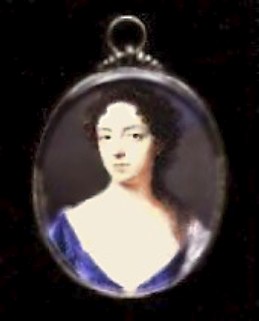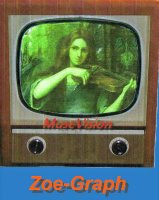Sunday, June 18, 2006



Take a look at some pictures of an intriguing looking woman. I found them on the web one day while just Googling the name “Anne” to while away the time. I began researching and soon realized I had stumbled on another very interesting character. The images are of Anne Kingsmill Finch, an English poet who lived from 1661 through 1720. She is also known as Anne of Winchilsea. She occupies an important place in British poetry as she was one of the first published women poets. The time is which she lived is one of my favorites in Art and Music history. She was married just about the same time Bach and Handel were born and she lived about the same time as
These pictures from
Her biography is interesting, yet complicated. She met her future husband, Heneage Finch, while she was Lady in Waiting to Mary of Modena, Queen Consort to James II of
Even today, Anne’s work exerts an influence on other creative people - a rare thing for poets of such a seemingly remote era. A sculptor in
Some examples of Anne Finch's poetry.
To The Nightingale
Exert thy Voice, sweet Harbinger of Spring!
This Moment is thy Time to sing,
This Moment I attend to Praise,
And set my Numbers to thy Layes.
Free as thine shall be my Song;
As thy Musick, short, or long.
Poets, wild as thee, were born,
Pleasing best when unconfin'd,
When to Please is least design'd,
Soothing but their Cares to rest;
Cares do still their Thoughts molest,
And still th' unhappy Poet's Breast,
Like thine, when best he sings, is plac'd against a Thorn.
She begins, Let all be still!
Muse, thy Promise now fulfill!
Sweet, oh! sweet, still sweeter yet
Can thy Words such Accents fit,
Canst thou Syllables refine,
Melt a Sense that shall retain
Still some Spirit of the Brain,
Till with Sounds like these it join.
'Twill not be! then change thy Note;
Let division shake thy Throat.
Hark! Division now she tries;
Yet as far the Muse outflies.
Cease then, prithee, cease thy Tune;
Trifler, wilt thou sing till June?
Till thy Bus'ness all lies waste,
And the Time of Building's past!
Thus we Poets that have Speech,
Unlike what thy Forests teach,
If a fluent Vein be shown
That's transcendant to our own,
Criticize, reform, or preach,
Or censure what we cannot reach.
To Death:
O King of terrours, whose unbounded sway
All that have life, must certainly obey.
The King, the Priest, the Prophet, all are thine,
Nor wou'd ev'n God, (in Flesh) thy stroke decline.
My name is on thy Role and sure I must,
Increase thy gloomy kingdoms, in the dust,
My soul at this, no apprehension feels,
But trembles at thy swords, thy racks, thy wheels,
Thy scorching fevers, which distract the sense,
And snatch us raving, unprepar'd from hence;
At thy contagious darts, that wound the heads
Of weeping friends, that wait at dying beds.
Spare these, and let thy time be when it will,
My business is to die, and thine to kill.
Gently, thy fatal sceptre on me lay,
And take to thy cold arms, insensibly thy prey